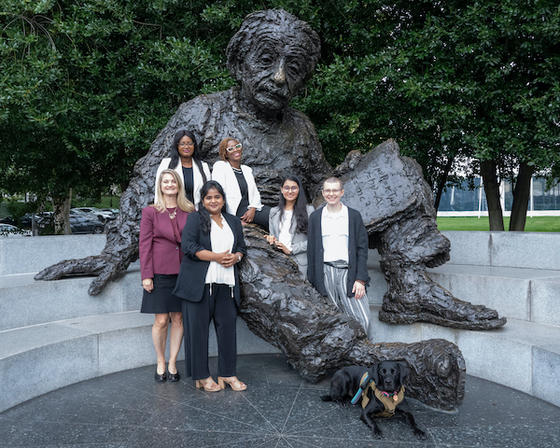Six graduate students from George Mason University’s Department of Global and Community Health and Department of Health Administration and Policy presented a four-pronged solution to address health care and homelessness among Washington, D.C., area women at the D.C. Public Health Case Challenge.
“It was a really exciting day,” said associate professor Debora Goldberg, who mentored them. “The students did an unbelievable job.”
The competition, held at the National Academy of Science, Engineering and Medicine, is a chance for students to use what they’ve learned in the classroom to address a real-world issue, Goldberg said.
Mason’s team used a divided approach, each taking a task that related to their research backgrounds to come up with a pilot study.

First-year health services research PhD student Sravya Vunnam was a member of the team that competed in the case competition.
“Before the actual competition, we did a dry run with six faculty members from HAP and [School of Nursing] who came and listened to our presentation to give us feedback and help us prepare,” said Vunnam.
“[Most] of us are going to be in public health and policy making somehow, so this experience helps to shape our minds and prepare us for that,” she said.
The team’s approach included housing, community and mental health support, developing an app that would provide resources for unhoused populations to find places that provide mental health support, and access peer navigators, as well as an anti-stigma campaign.
Because students bring skills that they learn in the classroom to these experiences, case competitions are also a great opportunity for students to practice in public health courses, said Goldberg.
Public health graduate student Anahita Asghari-Kamrani took the GCH 465 Community Health capstone course taught by adjunct professor Sara Hoffman, where she and her classmates got to compete in hypothetical competitions that are set up to replicate the real ones held by the public health community.
The class breaks into teams and identifies a public health problem for which they must find solutions. At the end of the semester, the student teams present their solutions to a panel of local public health professionals, similar to the official case competitions.
“The capstone course has helped me find problem areas in public health and [potential] interventions,” said Asghari-Kamrani, who is in the epidemiology program. “I would say that having an opportunity like this helps you get out of your comfort zone and [now] I would be comfortable participating in something like this in a real-life scenario.”
Community health alumna Madison Knapp also took the GCH 465 Community Health capstone.
“It's a great way of learning and being able to come up with ideas, especially since the world is changing each year and there are new scientific measures available every day,” said Knapp, who graduated in 2023 and now does community health work for the American Heart Association.
Knapp hopes to one day compete in real case competitions so that she can make a difference in her field and community, she said.
“We got to present to people from the Virginia Department of Health, and hearing their feedback was truly a great experience,” said Knapp, whose team ended up winning the hypothetical case competition. “I still think it's one of the best moments of my college career. I hope it encourages students to do the best they can in their courses because you never know what could come out of it.”
Want to know more about the case study competition? Read more in our earlier article about the event.
In This Story
Related News
- December 6, 2023
- November 13, 2023
- October 27, 2023
- September 26, 2023
- July 12, 2023
